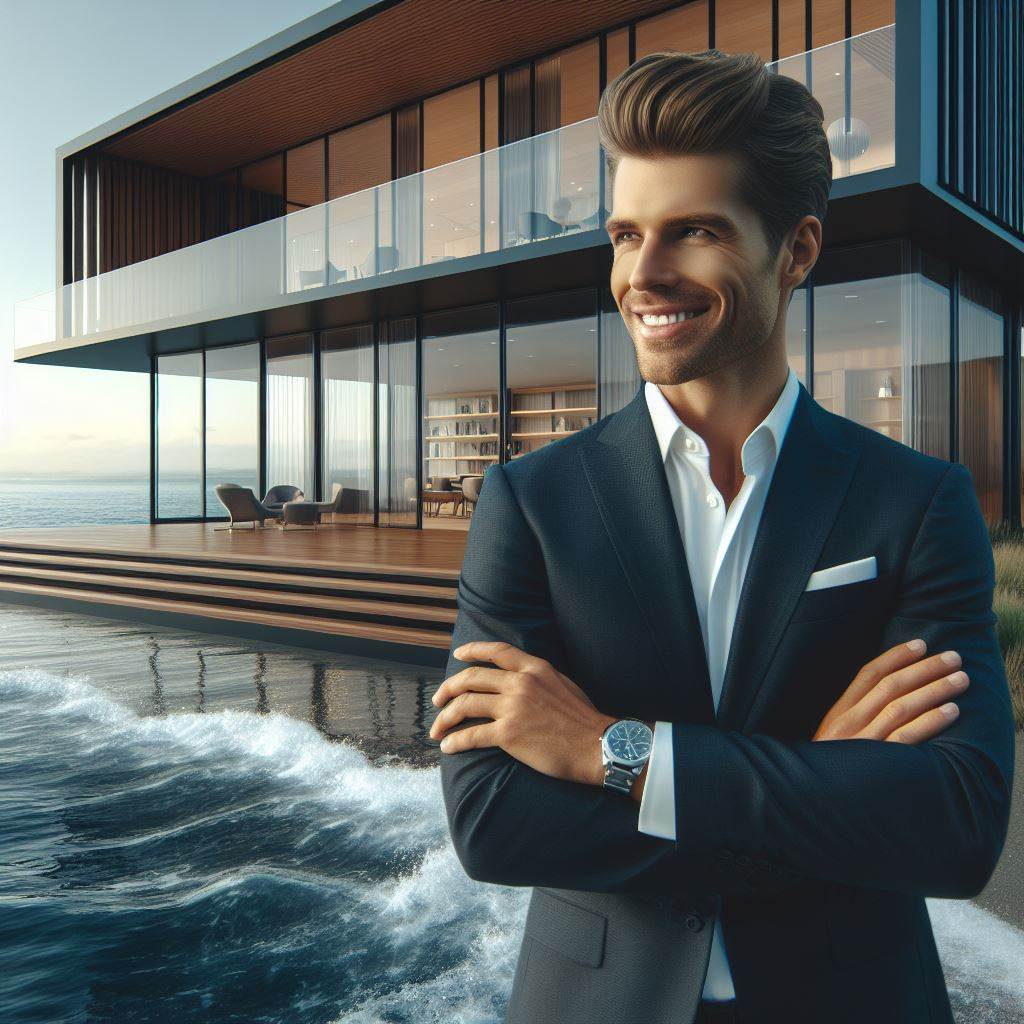Introduction
Luxury real estate is a unique market segment that caters to individuals with substantial financial means and a taste for high-end properties and amenities.
These buyers are typically looking for exclusivity, privacy, and exceptional quality in their real estate investments.
Therefore, it is essential for real estate professionals to gain an in-depth understanding of luxury buyer profiles in order to effectively meet their clients’ expectations.
Knowing the specific preferences and interests of luxury buyers allows real estate agents to provide personalized and tailored services.
These buyers often seek properties in desirable locations with breathtaking views, superior architecture, and top-of-the-line amenities such as infinity pools, private gyms, or wine cellars.
By comprehending these preferences, real estate professionals can curate a selection of properties that align with their clients’ tastes and specifications.
Moreover, understanding luxury buyer profiles provides insights into their purchasing behavior and motivations.
Luxury buyers may value exclusivity, rarity, and unique features in a property.
They might prioritize the reputation and prestige associated with a specific location or seek properties that have potential for investment or appreciation.
Real estate professionals who can anticipate these factors and provide expert advice can facilitate successful transactions and build strong relationships with their luxury clients.
In essence, the luxury real estate market requires a deep understanding of luxury buyer profiles to cater to their distinct tastes and preferences.
By acknowledging the importance of such knowledge, real estate professionals can differentiate themselves in this competitive sector and provide exceptional service to their affluent clientele.
Read: High-End Homes: Design Trends of the Year
Defining luxury buyer profiles
When it comes to understanding luxury buyer profiles, it is crucial to consider both demographic and psychographic factors.
These factors provide valuable insights into the characteristics and motivations of luxury buyers, helping luxury brands tailor their marketing strategies effectively.
Demographic factors
Demographic factors, like age, income level, occupation, and education level, serve as the foundation for identifying luxury buyer profiles.
Age is particularly important as it helps understand the generational preferences within the luxury market.
Younger luxury buyers, for example, may gravitate towards trendy and experiential luxury goods, while older buyers may prefer classic and timeless luxury products.
Income level is a key determinant of luxury buyers.
Luxury purchases are often associated with higher price points, making it essential for buyers to have a significant disposable income.
Luxury brands target individuals in higher income brackets to ensure affordability and exclusivity.
Occupation is another demographic factor that impacts luxury buyer profiles.
Buyers in high executive positions or successful entrepreneurs often have the financial means to indulge in luxury purchases.
Moreover, their occupation may also influence their preferences and needs, leading to targeted marketing efforts.
Education level is an indicator of the sophistication and discernment of luxury buyers.
Higher education equips individuals with the knowledge to appreciate quality, craftsmanship, and fine details offered by luxury brands.
As a result, luxury brands often cater to buyers with higher education levels.
Psychographic factors
Psychographic factors delve into the mindset and values of luxury buyers.
Understanding their lifestyle, interests, values, and aspirations is essential to create meaningful connections and resonate with them emotionally.
Luxury buyers often lead opulent lifestyles and seek out exclusive experiences.
They enjoy indulging in luxurious vacations, fine dining, and attending prestigious events.
Their interests often revolve around art, fashion, travel, and luxury experiences that align with their refined taste.
Values and aspirations are crucial in understanding luxury buyer profiles. Luxury buyers attach great importance to exclusivity, craftsmanship, and quality.
They aspire to stand out from the crowd and showcase their status through their luxury purchases.
Brands that align with these values can establish strong connections with luxury buyers.
Brand preferences are closely tied to luxury buyer profiles.
Luxury buyers are loyal to established luxury brands known for their heritage, craftsmanship, and reputation.
They seek brands that embody their desired image, exclusivity, and status.
Luxury brands must evoke emotions and create aspirational narratives to attract and retain luxury buyers.
Purchase motivations play a significant role in understanding luxury buyer profiles.
Luxury buyers are often motivated by the desire for self-indulgence, status, and the opportunity to differentiate themselves from others.
Luxury purchases provide them with a sense of gratification and serve as a symbol of achievement.
In fact, luxury buyer profiles encompass both demographic and psychographic factors.
Demographic factors including age, income level, occupation, and education level provide foundational insights, while psychographic factors such as lifestyle, interests, values, and aspirations delve into the mindset and motivations of luxury buyers.
Understanding these profiles enables luxury brands to tailor their marketing strategies, create meaningful connections, and meet the unique needs and desires of luxury buyers.
Read: Historic Estates: Luxury with a Past
Trends in luxury buyer profiles
As luxury markets evolve, trends in luxury buyer profiles continue to adapt to changing dynamics in society.
Understanding these trends can provide valuable insights for industry professionals.
Shifts in demographics
One noticeable trend is the emergence of younger luxury buyers. Traditionally, luxury consumption was associated with older individuals.
However, younger generations, such as millennials and Gen Z, are actively entering the luxury market.
These younger luxury buyers bring fresh perspectives and preferences, shaping the future of luxury consumption.
In addition to age, luxury buyer demographics are becoming increasingly diverse.
Luxury buyers come from various ethnicities, nationalities, and cultural backgrounds.
This diversity contributes to a broader range of tastes, preferences, and demands within the luxury market.
Luxury brands and developers must take this diversity into account when creating their products and marketing strategies.
Influences from technology and globalization
Advancements in technology and the rise of social media have significantly impacted luxury buyer behavior.
The influence of social media and online platforms cannot be underestimated.
Luxury buyers now have access to a vast amount of information, reviews, and visuals that influence their purchasing decisions.
They can directly engage with brands and other consumers, shaping their perception of luxury products and services.
Moreover, globalization has made luxury markets more interconnected. Luxury buyers from different countries have distinct profiles and preferences.
For example, Asian luxury buyers have different preferences compared to their European or North American counterparts.
This globalization of luxury markets allows for greater exposure and opportunities for luxury brands and developers.
Changing luxury buyer behaviors
As sustainability and eco-consciousness become increasingly important, luxury buyers are demanding sustainable and eco-friendly properties.
They prioritize environmentally friendly features and materials when making their luxury property purchases.
This shift reflects a growing awareness of environmental issues and a desire to align luxury lifestyles with sustainable values.
Furthermore, luxury buyers now seek unique and experiential features in their properties.
They are no longer satisfied with cookie-cutter luxury homes but instead desire one-of-a-kind experiences and personalized elements that reflect their individuality and status.
Developers are incorporating exclusive amenities, customized designs, and immersive experiences to cater to this evolving demand.
In short, trends in luxury buyer profiles are constantly evolving due to shifts in demographics, influences from technology and globalization, and changing buyer behaviors.
As the luxury market continues to transform, understanding these trends is crucial for industry players to effectively meet the evolving demands of luxury buyers.
Read: Luxury Market Forecast: What Experts Say

Insights for targeting luxury buyers
Luxury buyers have unique tastes, preferences, and priorities when considering high-end purchases.
To effectively target this discerning audience, it is crucial for marketers and businesses to understand specific insights and trends.
By tailoring marketing strategies to individual buyer profiles and preferences, brands can create personalized experiences that resonate on an emotional level.
Customization and personalization
One key insight in targeting luxury buyers is customization and personalization.
Luxury buyers appreciate tailored marketing strategies that speak directly to their desires and preferences.
By conducting thorough research and segmentation, businesses can identify the key aspects that drive a luxury buyer’s decision-making process.
This allows them to develop targeted messaging and campaigns that align with their specific tastes and values.
Furthermore, emotional connections play a significant role in attracting and retaining luxury buyers.
Luxury purchases are often driven by desire, aspiration, and exclusivity.
By creating emotionally engaging content and experiences, brands can establish a deep connection with their target audience.
This can be achieved through storytelling, highlighting craftsmanship, and leveraging the brand’s heritage and prestige.
Leveraging technology and data
Another crucial insight for targeting luxury buyers is leveraging technology and data.
In today’s digital age, data analytics can provide valuable insights into buyer preferences and behaviors.
By analyzing data, businesses can spot patterns and trends, allowing them to optimize their marketing strategies and offerings.
Understanding the luxury buyer’s journey and preferences enables brands to create personalized experiences that exceed expectations.
Furthermore, virtual and augmented reality technologies have revolutionized the real estate industry.
Luxury properties can now be showcased remotely, allowing buyers to immerse themselves in virtual tours and interactive experiences.
This technology enables potential buyers to visualize themselves in the property, providing a unique and immersive selling approach.
Collaborations and partnerships
Collaborations and partnerships are also essential when targeting luxury buyers.
By aligning with luxury brands and influencers, businesses can enhance their brand image and reach a wider audience.
Collaborations can include co-branded campaigns, limited edition products, or exclusive events that appeal to luxury buyers’ desire for uniqueness and exclusivity.
Networking and building relationships with real estate agents specializing in luxury properties is another effective strategy.
Real estate agents who understand the luxury market can provide valuable insights and connections.
Building trust and rapport with these agents can result in referrals and access to exclusive buyers looking for luxury properties.
In general, targeting luxury buyers requires a deep understanding of their preferences and priorities.
By customizing marketing strategies, leveraging technology and data, and forming collaborations and partnerships, brands can effectively attract and engage luxury buyers.
It is crucial to prioritize personalization, emotional connections, and utilizing innovative technologies to create unique experiences that resonate with this discerning audience.
Read: Luxury Real Estate: Pandemic Impact Analysis
Conclusion
Recap of key points discussed
- Luxury buyers are becoming younger and more diverse.
- They value experiences, sustainability, and personalized services.
- Digital platforms and social media play a significant role in their purchasing decisions.
- Brands need to focus on storytelling, authenticity, and emotional connections.
Importance of continuously monitoring and adapting to luxury buyer profiles
Keeping up with changing buyer preferences is crucial for luxury brands in the real estate market.
By staying updated on trends and insights, brands can tailor their marketing strategies and offerings to meet the evolving demands of luxury buyers.
This will help them stay ahead of the competition and maintain customer loyalty.
Final thoughts on the future of luxury buyer profiles in the real estate market
The future of luxury buyer profiles will likely see further diversification and a greater emphasis on sustainability.
As younger generations become the primary luxury buyers, brands must be prepared to adapt their strategies and offerings to meet the unique needs and preferences of these buyers.
The use of technology and digital platforms will continue to play a significant role in connecting with luxury buyers and providing personalized experiences.
To thrive in the real estate market, brands must be proactive in understanding and catering to the evolving luxury buyer profiles.




